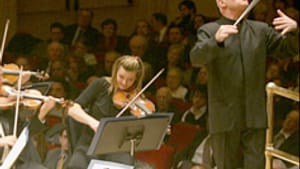Stay in the Loop
BSR publishes on a weekly schedule, with an email newsletter every Wednesday and Thursday morning. There’s no paywall, and subscribing is always free.
Once more, with mystification:
Why is Eschenbach leaving?
DAN COREN
The Sunday New York Times of May 18 chronicled the dismay of New York Philharmonic musicians at Riccardo Muti’s choosing the Chicago Symphony Orchestra over the opportunity to lead them. As an ex-New Yorker married to a proud Philadelphia native, I’ve been reminded time and again– quite accurately, I must admit– that New Yorkers tend to forget that Philadelphia even exists.
Sure enough, the Times article was as provincial and as Big-Apple-centric as can be. Neither Muti’s 12-year tenure in Philadelphia nor his subsequent troubles at La Scala were mentioned even in passing. Needless to say, neither did the Times mention what was on the minds of Philadelphia music-lovers this weekend: the end of Christoph Eschenbach’s tenure at Muti’s former orchestra.
At the other extreme were the Eschenbach post-mortems by Peter Dobrin and David Patrick Stearns that appeared in the same Sunday’s Philadelphia Inquirer.
What stuck most in my mind from these two articles was the image of Orchestra members cornering Stearns in the elevator and pleading their case against Eschenbach— a situation that Stearns, to his credit, found unsettling and inappropriate. Nevertheless, the conclusion is inevitable: Eschenbach’s departure was brought about by the sniping of at least some of the musicians playing under him.
Talk radio for musicians?
When Billy Wagner, the former Phillies reliever (now with the Mets), complained about his teammates, we knew about it. We also knew that Pat Burrell despised Wagner for talking to the press. Nearly every sports fan in Philadelphia knows why the initials T.O. stand for internal team dissension. Can you imagine a world in which musical athletes— that is, members of the Orchestra— were subject to the same sort of scrutiny? Suppose Howard Eskin did classical music talk radio?
“OK, genius, I’m going to explain this to you. There’s nothing wrong with Christoph Eschenbach. His job is to conduct. The players are supposed to play. Jimmy Virtuoso should worry about his bowing and intonation and stop whining. OK? Do you get that? Nitwit!”
Alas, such transparency doesn’t exist. We’ll have to make do with anonymous backstabbing and innuendo.
Less than perfect
I had made what may have been the mistake of reading the Dobrin and Stearns commentaries on Saturday morning (May 17). Consequently they were never far from my mind during Eschenbach’s riveting performances of the Schubert Eighth and Ninth Symphonies on Saturday night.
The performances that night, I feel duty-bound to report, were not perfect. In the Ninth (the "Great"), what should have been the long magical pianissimo that begins the recapitulation of the first movement— the passage that Szell and Toscanini infused with such hushed tension— was a tepid mezzo-piano. I could swear things fell apart a little bit in the development section. The filigree solo trumpet work that accompanies the main melody in the middle of the second movement was a bit ragged. No matter. The overall conception of the performance and the transcendent greatness of the music itself erased the little nits I’ve just picked.
I wondered, as I have so many times before: How can Eschenbach get such wonderful playing out of musicians who don’t like him very much? I know, I know— the stock answer is, “Well, they’re professionals, after all.” True, perhaps, but unsatisfying. Why do the Orchestra’s musicians, especially the many young ones, always seem to be having so much fun playing for him? Call me a naïve idiot if you like, but even after all the analysis, even after all the anecdotal evidence we’ve heard, Eschenbach’s failure in Philadelphia remains a mystery to me.
No place to hide
There was a happy ending on Saturday, a sweeter one that I would never have dared hope for. As a bonus, Eschenbach joined four other Orchestra members in a performance of Schubert’s Trout Quintet.
In chamber music— especially in this chamber music— there’s no place to hide. Any pianist who dares play this work, which sounds so simple and effortless but is in truth relentlessly difficult, bares his musical soul. Eschenbach laid down his part as if he were a jazz great in the Bill Evans mold– quietly, unobtrusively, lyrically– while his young colleagues sent us all off into the night with a beautiful rendition of Schubert’s most intimate, ingratiating music.
Thank you, Maestro Eschenbach. It was a great run, albeit a brief one.
To read a response, click here.
For a related commentary by Robert Zaller, click here.
Why is Eschenbach leaving?
DAN COREN
The Sunday New York Times of May 18 chronicled the dismay of New York Philharmonic musicians at Riccardo Muti’s choosing the Chicago Symphony Orchestra over the opportunity to lead them. As an ex-New Yorker married to a proud Philadelphia native, I’ve been reminded time and again– quite accurately, I must admit– that New Yorkers tend to forget that Philadelphia even exists.
Sure enough, the Times article was as provincial and as Big-Apple-centric as can be. Neither Muti’s 12-year tenure in Philadelphia nor his subsequent troubles at La Scala were mentioned even in passing. Needless to say, neither did the Times mention what was on the minds of Philadelphia music-lovers this weekend: the end of Christoph Eschenbach’s tenure at Muti’s former orchestra.
At the other extreme were the Eschenbach post-mortems by Peter Dobrin and David Patrick Stearns that appeared in the same Sunday’s Philadelphia Inquirer.
What stuck most in my mind from these two articles was the image of Orchestra members cornering Stearns in the elevator and pleading their case against Eschenbach— a situation that Stearns, to his credit, found unsettling and inappropriate. Nevertheless, the conclusion is inevitable: Eschenbach’s departure was brought about by the sniping of at least some of the musicians playing under him.
Talk radio for musicians?
When Billy Wagner, the former Phillies reliever (now with the Mets), complained about his teammates, we knew about it. We also knew that Pat Burrell despised Wagner for talking to the press. Nearly every sports fan in Philadelphia knows why the initials T.O. stand for internal team dissension. Can you imagine a world in which musical athletes— that is, members of the Orchestra— were subject to the same sort of scrutiny? Suppose Howard Eskin did classical music talk radio?
“OK, genius, I’m going to explain this to you. There’s nothing wrong with Christoph Eschenbach. His job is to conduct. The players are supposed to play. Jimmy Virtuoso should worry about his bowing and intonation and stop whining. OK? Do you get that? Nitwit!”
Alas, such transparency doesn’t exist. We’ll have to make do with anonymous backstabbing and innuendo.
Less than perfect
I had made what may have been the mistake of reading the Dobrin and Stearns commentaries on Saturday morning (May 17). Consequently they were never far from my mind during Eschenbach’s riveting performances of the Schubert Eighth and Ninth Symphonies on Saturday night.
The performances that night, I feel duty-bound to report, were not perfect. In the Ninth (the "Great"), what should have been the long magical pianissimo that begins the recapitulation of the first movement— the passage that Szell and Toscanini infused with such hushed tension— was a tepid mezzo-piano. I could swear things fell apart a little bit in the development section. The filigree solo trumpet work that accompanies the main melody in the middle of the second movement was a bit ragged. No matter. The overall conception of the performance and the transcendent greatness of the music itself erased the little nits I’ve just picked.
I wondered, as I have so many times before: How can Eschenbach get such wonderful playing out of musicians who don’t like him very much? I know, I know— the stock answer is, “Well, they’re professionals, after all.” True, perhaps, but unsatisfying. Why do the Orchestra’s musicians, especially the many young ones, always seem to be having so much fun playing for him? Call me a naïve idiot if you like, but even after all the analysis, even after all the anecdotal evidence we’ve heard, Eschenbach’s failure in Philadelphia remains a mystery to me.
No place to hide
There was a happy ending on Saturday, a sweeter one that I would never have dared hope for. As a bonus, Eschenbach joined four other Orchestra members in a performance of Schubert’s Trout Quintet.
In chamber music— especially in this chamber music— there’s no place to hide. Any pianist who dares play this work, which sounds so simple and effortless but is in truth relentlessly difficult, bares his musical soul. Eschenbach laid down his part as if he were a jazz great in the Bill Evans mold– quietly, unobtrusively, lyrically– while his young colleagues sent us all off into the night with a beautiful rendition of Schubert’s most intimate, ingratiating music.
Thank you, Maestro Eschenbach. It was a great run, albeit a brief one.
To read a response, click here.
For a related commentary by Robert Zaller, click here.
Sign up for our newsletter
All of the week's new articles, all in one place. Sign up for the free weekly BSR newsletters, and don't miss a conversation.

 Dan Coren
Dan Coren
